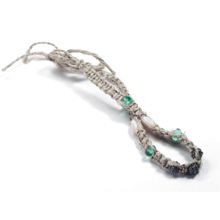 As one of the oldest crops grown by mankind, hemp features heavily in the history books of many nations: In fact, some of the oldest historical texts and important manuscripts in museums across the globe are written on paper which has been made from this most versatile of natural resources…
As one of the oldest crops grown by mankind, hemp features heavily in the history books of many nations: In fact, some of the oldest historical texts and important manuscripts in museums across the globe are written on paper which has been made from this most versatile of natural resources…
Whilst this most distinguished crop is associated with rope, paper and textiles, there are a number of ingenious uses for hemp which you might not have heard of before…
When it comes time to pick out a gift for that special someone, or even to treat yourself to a new item of jewellery – images of gold, diamonds and pearls might come to mind: But if you’d like to choose an item which is environmentally friendly, uniquely designed and which projects a different image from the normal formulaic bracelets, rings and necklaces out there, you need look no further than hemp!
 Hemp is an extremely forgiving material to work with: It’s strong, easy to work into a myriad of shapes and durable enough to make artefacts which will survive the test of time.
Hemp is an extremely forgiving material to work with: It’s strong, easy to work into a myriad of shapes and durable enough to make artefacts which will survive the test of time.
By weaving hemp fibres into geometric patterns, carefully joining various knot segments together and applying a touch of creativity to their art, it is possible for skilled craftsmen to produce masterful pieces which will make the perfect addition to any jewellery box!
Fuel
There is no doubt that fossil fuels have played a big part in shaping the world we live in today: They have powered heavy industry, made the planet a smaller place and now assist us in our day to day lives: But they have also helped to make the world a much more polluted, unhealthy place to live – and for all the ways these unsustainable fuels have helped us, they’ve also generated many problems for our beautiful green planet, which look set to plague future generations unless we make a change today.
Things might have been different if oil companies hadn’t seized a stranglehold on the world’s fuel industry: In fact, advances in fuel technology back in the 1890s made it possible for hemp biofuel to be used as a renewable source of energy, even when the automobile industry was still in it’s infancy: By the 1940s, pioneers like Henry Ford even planned for their new automobiles to run on this green bio-fuel: Just imagine how our planet might look today if oil refineries were replaced by hemp fields!
Automobile construction
Whilst Henry Ford deserves a mention for his promotion of hemp biofuel, he also spent a lot of time and money trying to develop a new breed of car, which was intended to be manufactured from hemp and soybean derived body-panels: Such a car would be lighter, stronger and more fuel efficient than the all-steel cars of the day: Sadly, this development was not to be, thanks to war, politics and the technology of the day, but the dream of being able to ‘grow automobiles from the soil’ lives on today, in the form of hemp bio-plastic components.
Big-name manufacturers now use hemp fibre, flax and a number of other materials to produce low-cost, environmentally-friendly, light and strong bio-plastic components for every kind of vehicle imaginable, from luxury executive saloons to small family hatchbacks.




